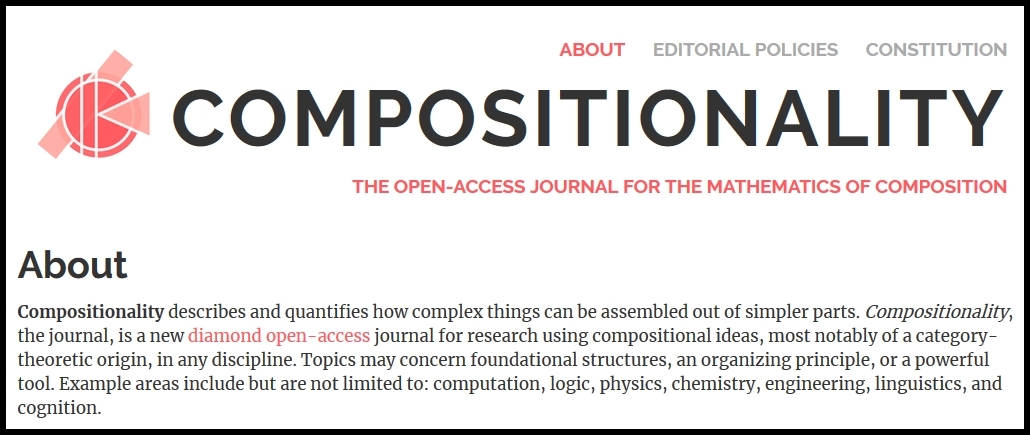Compositionality
Posted by John Baez
A new journal! We’ve been working on it for a long time, but we finished sorting out some details at Applied Category Theory 2018, and now we’re ready to tell the world!
Here’s the top of the journal’s home page right now:
Here’s the official announcement:
We are pleased to announce the launch of Compositionality, a new diamond open-access journal for research using compositional ideas, most notably of a category-theoretic origin, in any discipline. Topics may concern foundational structures, an organizing principle, or a powerful tool. Example areas include but are not limited to: computation, logic, physics, chemistry, engineering, linguistics, and cognition. To learn more about the scope and editorial policies of the journal, please visit our website at www.compositionality-journal.org/
Compositionality is the culmination of a long-running discussion by many members of the extended category theory community, and the editorial policies, look, and mission of the journal have yet to be finalized. We would love to get your feedback about our ideas on the forum we have established for this purpose:
http://reddit.com/r/compositionality
Lastly, the journal is currently receiving applications to serve on the editorial board; submissions are due May 31 and will be evaluated by the members of our steering board: John Baez, Bob Coecke, Kathryn Hess, Steve Lack, and Valeria de Paiva.
https://tinyurl.com/call-for-editors
We will announce a call for submissions in mid-June.
We’re looking forward to your ideas and submissions!
Best regards,
Brendan Fong, Nina Otter, and Joshua Tan


Re: Compositionality
Someone asked about the phrase “diamond open access” on the journal’s home page.
Gold open access is where authors pay to publish in a journal and their article is then free for others to read. The journal is usually peer-reviewed.
Green open access is where authors put their work in a repository that’s free for others to read — like the arXiv, or PubMed. This is often done in addition to publishing the paper in a journal, since these repositories are typically not peer-reviewed.
Diamond open access is where authors publish in a peer-reviewed journal that’s free for others to read, and the authors don’t have to pay to do this.